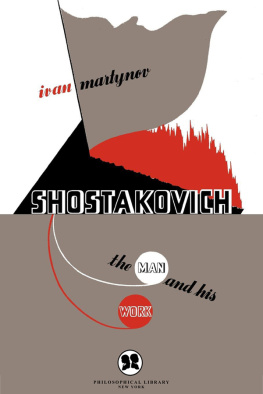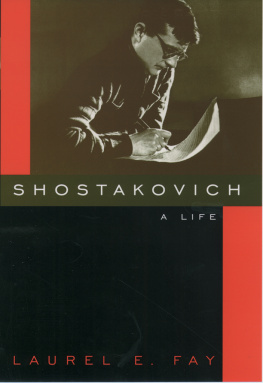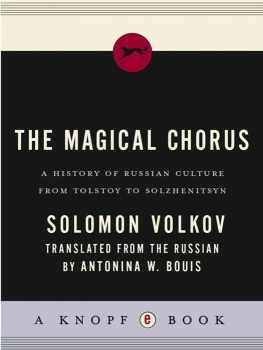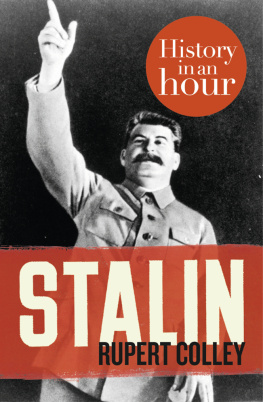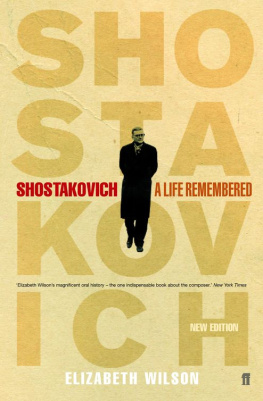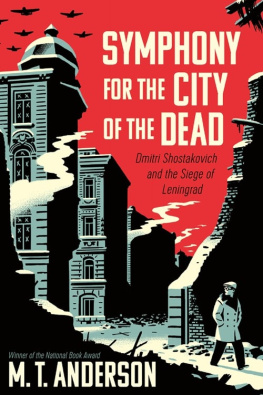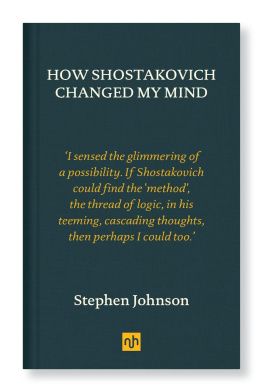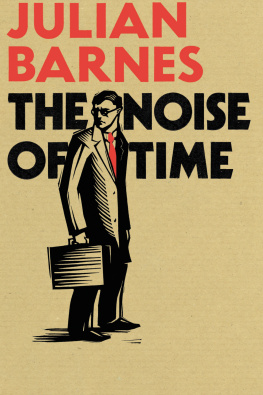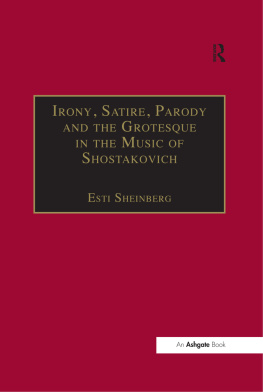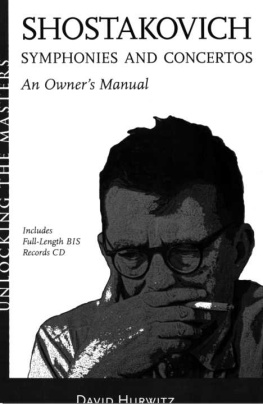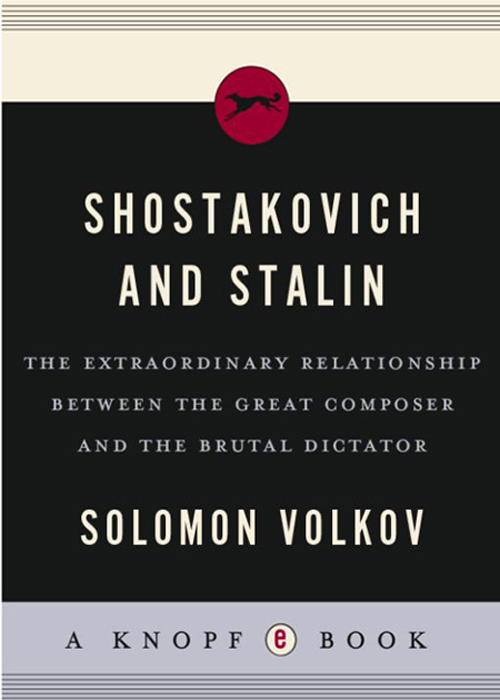
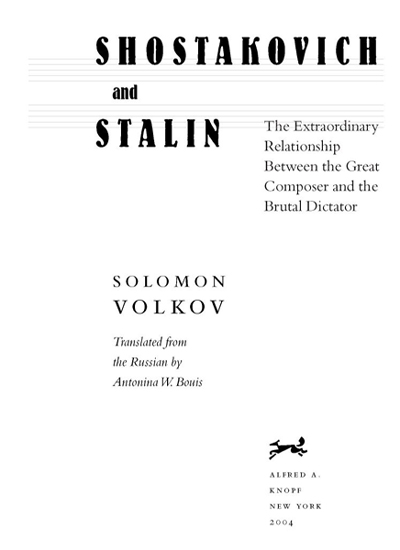
Table of Contents
Preface
If you dont count the mythic Greek singer Orpheus, probably no one suffered more for his music than the Soviet composer Dmitri Shostakovich. He was branded an anti-people musician,1 and his work was dismissed as an intentionally discordant, muddled flow of sound. 2 For many years, Shostakovich and his family balanced precariously on the edge of catastrophe, under constant threat of arrest, exile, or worse.
This was because the abuse came directly from the Supreme Leader of his homelandJoseph Stalin himself. To be sure, it was also accompanied by state prizes and carefully doled-out encouragement. Unfortunately, one never knew when lightning would strike. This made Shostakovichs life a living hell for many years.
These were unimaginably cruel times, when Shostakovichs friends, patrons, and family members suddenly disappeared, drawn into the maelstrom of Stalinist repression. How, under these circumstances, Shostakovich managed not only to keep his sanity, but also to write some of the most enduring, almost shockingly expressive, and at the same time touchingly humane music of the twentieth century constitutes the story of this book. It gives the fullest account yet of the arguably unprecedented duel between the composer and Joseph Stalin, the countrys Communist tsar and Shostakovichs personal tormentor. In fact, it is the first such book-length account in any language.
After my arrival in the United States in 1976, I heard Shostakovichs work performed countless times in Western concert halls, and I often wondered: Why this rapt attention from the public? Why does palpable tension envelop audiences who know little or nothing about the conditions under which these tormented and tormenting sounds were created?
We in the USSR grew up with Shostakovichs music practically under our skin. Its gloomy melodies, trampling rhythms, and bellowing orchestral writing perfectly suited our moods and inner thoughts, which we tried to conceal from the watchful eyes and long ears of the Soviet authorities.
But here in the democratic West, Shostakovichs music could easily be dismissed as importunate, primitive, and bombastic. And in fact, many professionalscomposers and musicologists especially expressed these disparaging views of Shostakovich, castigating him for his apparent squareness. It was primarily the performers and listeners who ultimately saved the composers reputation. Audiences flocked to performances of Shostakovichs works, clearly finding in them some vitally needed emotional sustenance.
A perceptive explanation for their reaction was recently offered by the American writer Lawrence Hansen. Shostakovichs music tapped into our most fundamental, primal fear: the destruction of the self by outside forces, the fear of life being pointless and meaningless, the sheer evil that may be found in ones fellow man. He added that Shostakovich offers a terrifying yet cathartic emotional roller-coaster ride.3
And yet the man behind this powerfully direct oeuvre remained an enigma, just a fuzzy image of an artist disappearing into the Stalinist landscape, an image that could morph, in the spirit of American science fiction, into the likeness of the observer. Especially handicapping in this respect was the absence of a firm factual backdrop, integrated into a broader political and cultural picture of the times.
I am presenting the most detailed reconstruction to date of the two pivotal events that connected Shostakovich and Stalin: Stalins denunciation of Shostakovichs great opera Lady Macbeth of Mtsensk in 1936 and the Communist Party resolution of 1948 censuring Shostakovich and other leading Soviet composers. Particularly close attention is given to the 1936 affair, which in the annals of the twentieth century came to symbolize the extent to which an oppressive state can manipulate culture.
I also make the case for Stalins writing or dictating the infamous 1936 Pravda editorial Muddle Instead of Music, which attacked Shostakovich savagely, and I attribute, for the first time, other important unsigned texts to him. I cannot underscore enough how personal and sometimes obsessive was Stalins involvement in micromanaging Soviet culture in general and Shostakovich in particular.
All this is important because the prevailing contemporary thinking is uncomfortable assigning too much credit to any one personality and tends to overrate the influence of a faceless bureaucracy in matters political and cultural. Yet the notion of the cult of personality is not without foundation.
I had no plans for the present book, having for many years turned down offers to write Shostakovichs biography.What finally persuaded me was the distortion of Shostakovichs image that started to take hold long after Stalins abuse of him was relegated to the proverbial dustbin of history.
It was in United States academic circles, of all places, that Shostakovich was proclaimed (allegedly ironically) to be perhaps Soviet Russias most loyal musical son,4 and his opera Lady Macbeth of Mtsensk denounced (decidedly without a trace of irony) as a profoundly inhumane work of art, with the damning conclusion that its technique of dehumanizing victims is the perennial method of those who would perpetrate and justify genocide... if ever an opera deserved to be banned, it was this one.5
After this resolutely expressed but somewhat belated solidarity with the Stalinist views of Shostakovich as the ultimate anti-people composer, other learned voices describing him merely as a wuss, 6 cowardly,7 and a mediocre human being, 8 and bemoaning his moral impotence and servile complicity 9 could be perceived as almost harmless.
Yet I felt they all sounded equally false. This picture of Shostakovich, pretending to be objective and therefore relying heavily on his official declarations, looked to me and many of my compatriot musicians as crooked as any of the Soviet concoctions about the composer. This was not a portrait of the Shostakovich we knew, but an ideologically biased contraption which little resembled the seemingly fragile and unassuming man who nevertheless cut a complex and contradictory but ultimately courageous figure and whose music electrified and terrified audiences worldwide: not a victim but, rather, a victor, though definitely scarred for life by his ordeal.
Debates around Shostakovichs image and his oeuvre are no less intense now than in his lifetime. This is no quirk of fate. We live in highly politicized times. Confrontations about Shostakovich continue to start over aesthetic issues but quickly cut to the political bone.
It was often noted that the composers profession de foi was confrontation with evil and the defense of man. (The same could be said about Dostoevsky, also a highly politicized figure.) When I came to the West more than a quarter-century ago, such a creative motto sounded hopelessly pass and was frowned upon. Not anymore.
Looking at our troubled horizon today, we could use the dark glass of Shostakovichs music and swim with him in overwhelming waves of torment, grief, and unrelieved angst. But with him we also experience revulsion in the face of evil, deep sorrow for its victims, and the strengthening resolve to overcome it. Therein lies at least one of the reasons that will keep Shostakovichs music center stage in contemporary culture. It will serve for a long time to come as a prime example of politically engaged art of the highest order.
Next page

